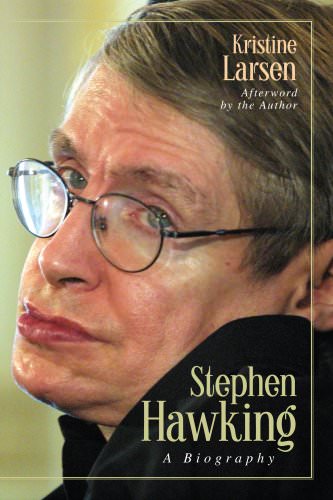[/caption]
The famous can beguile the masses with images of splendour and supremacy. Science, as with other avenues, can be the basis for such imagery. Yet, Kristine Larsen shows in her book ‘Stephen Hawking – A Biography‘, the bestowed fame can be both pleasant and harmful to the recipient.
As Stephen Hawking is famous, he needs no introduction. However, though famous for his contributions to science, he’s also well known for being one of the longest lived and productive survivors of amyotrophic lateral sclerosis (ALS). And, for those who call him ‘dad’, he’s also the headman of a household. With this, a biography almost begs to be presented.
And, as the title suggests, Larsen’s book aims to satisfy such a desire. The book achieves satisfaction which is good for the reader. But, there’s no surprise that Larsen is a professor of physics and astronomy, as the book leans heavily toward describing Hawking’s contributions to science. Through a chronological format, the book advances through milestones of his life: his early family experiences, times at school, survival as a post grad and fulfillment as a researcher and family man. All the well known events seem present, whether writing one of the most well-known but unread books, appearing on Star Trek or careening about via his electric wheel chair. These, together with discussions about Hawking’s work on black hole horizons, universe topology and unifying theory, all serve to confirm the truth of most of the newspaper articles about Hawking’s accomplished life.
If confirmation of the articles was all that the reader sought, then this book well satisfies. However, if the reader was hoping for a bit more detail about Hawking’s personality, his private life, or his inspiration, then the book proves less satisfactory. The book does cover the technical concepts of Hawking’s work, however it’s only to the depth of interest and ability held by an average reader. So, while this book encapsulates Hawking’s life, it doesn’t add much to what’s readily available.
With news that Stephen Hawking has or is near retiring, the curious will understandably want to know a bit more of this well known scientist. Kristen Larsen’s book ‘Stephen Hawking – A Biography‘ is a great first step in learning more about this accomplished scientist. It’s a brief history of what has fortunately not been a brief life.
Read more reviews online or purchase a copy from Amazon.com.


I hear that his stance on his work is impregnable once he has stated something as so, there’s noone that can tell him different (arrogance/confidence you decide).
Maybe thats the way you have to be when facing so much criticism.
He is a great man and a great scientist !
I wonder who theyll hire to replace him.
Stunning how a man who can physically do so little, had contributed so much to physics…
Mark Mortimer says
“So, while this book encapsulates Hawking’s life, it doesn’t add much to what’s readily available. ”
Are you saying we shouldn’t buy the book Mark? 😉
Emission Nebula wonders:
“who theyll hire to replace him”
Brandon Carter, Jim Bardeen, Michio Kaku, Martin Rees, Neil deGrasse Tyson, Fraser Cain, Pamela Gay, AND the X-Men…..
😉
A genius indeed he is, but I wonder who first proposed what is now known as ‘Hawking Radiation’?
He’s had quite an amazing career and has truly made some great contributions to science.
Another stunning “feat” in his life: He can barely move, yet he was able to divorce his first wife of 25 years and marry his nurse.
See, the so-called disabled aren’t saint, they’re just people, too. Hawking just happened to know a bit more science than most.
great scientist given his condition.
Hawking Radiation is by Hawking, of course.
boom-dee-yatta
“A genius indeed he is, but I wonder who first proposed what is now known as ‘Hawking Radiation’?”
Um, that would be Hawking himself who first theorized that virtual par production that happens throughout all space, would occasionally force some particles to be ‘real’ at a black hole’s event horizon, and appear to radiate from it, as its twin falls into the hole, decreasing its mass energy, eventually to nothing.
The process is inversely related to the hole’s mass, increasing and radiating more strongly as it shrinks. A hole of stellar mass wold take many, many times the age of the Universe to evaporate. A hole with the mass of an asteroid, if formed at the Big Bang, would be disappearing right about now. And one with the mass of typical subatomic particles…well if you blinked, you missed it.
Steve worked this out when exploring how the laws of thermodynamics and quantum physics should apply to black holes, and the process was given his name.
I liked the comment that he wrote one of the must successful lay-person books on the history of the universe, but in fact, most people just stuck it on the shelf.
I just found out the other day that my daughter thought he was American, because of the accent of his voice synthesiser! 🙂